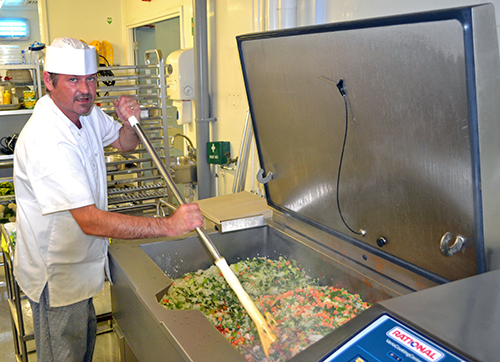Media Release
Date: 13 September 2019
Investment in hospital kitchens reduces waste and energy use
A £100k investment in the kitchens at the Royal United Hospitals Bath NHS Foundation Trust has seen the hospital slash its energy and water use while reducing food waste.
The latest in cooking technology has seen five new cookers replace the seven old, outdated boiling pans. The new computer-controlled Vario Cooking Centres (VCCs) are electronically-driven and have individual heating squares which only heat the areas of the cooker that are needed, keeping energy use down.

Chefs are also able to programme the cookers for each meal they are making, so that the temperature stays consistent for each dish.
Food is now cooked quicker and with perfect timing, so there is less waste. As a result, the RUH is now buying 10% less meat each year, without reducing the amount of meat used in its dishes.
Head of Facilities Philip Watson said: "What used to take two hours to cook can now be ready in 45mins as the new cookers are so much more energy-efficient.
"They also make it easier to cook meat, so there is less chance of our meat dishes being overcooked and having to be thrown away.
"We are also using a lot less water. The new cookers allow you to programme how much water is needed for each meal and they will provide the exact amount. They're also easier to clean. The old boiling pans took around 200 litres of water to wash, but the new cookers need only 10 litres, so that's a massive reduction."
The kitchen chefs use the cookers to create around 45,000 patient meals each month and there has been positive feedback from patients about the food.
Philip said: "The RUH is committed to being a sustainable organisation and we are always looking at ways to reduce waste and use less energy.
"This investment in our kitchens has made them more environmentally-friendly and reduced costs too, while hopefully providing our patients with even better quality, tastier food."
RUH food facts
Each month the RUH kitchens use an average of:
- 7,500 free range eggs
- 4,166 2ltr cartons of semi-skimmed milk
- 2,916 loaves of wholemeal bread
- 3,200 250g blocks of butter
- 750 lettuces
- 916 cucumbers
- 350kg of diced chicken
- 1,500 chicken fillets
- 14,400 vanilla ice creams
ENDS
Notes to Editor
- The Royal United Hospitals Bath NHS Foundation Trust provides acute treatment and care for a catchment population of around 500,000 people in Bath, and the surrounding towns and villages in North East Somerset and Western Wiltshire. The hospital provides healthcare to the population served by four Clinical Commissioning Groups: Bath & North East Somerset CCG, Wiltshire CCG, Somerset CCG and South Gloucestershire CCG.
- The Trust has 759 beds and a comprehensive range of acute services including medicine and surgery, services for women and children, accident and emergency services, and diagnostic and clinical support services.
- In 2015 The Royal United Hospitals NHS Foundation Trust acquired the Royal National Hospital for Rheumatic Diseases (RNHRD) NHS Foundation Trust. The RNHRD treats patients from across the country offering services in rheumatology, chronic pain, chronic fatigue syndrome/ME, cancer related fatigue and fatigue linked to other long term conditions such as multiple sclerosis.
- The RUH is changing - we have an exciting programme of redevelopment underway transforming our site and further improving the services we provide. The Trust has opened the purpose-built RNHRD and Brownsword Therapies Centre and is now working towards the new Dyson Cancer Centre. For more details visit: www.ruh.nhs.uk/fit4future

